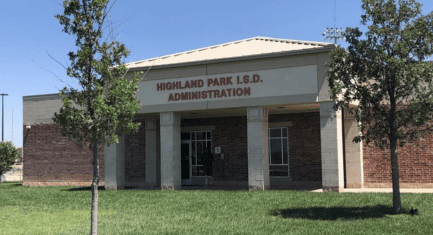Allegations are swirling that Texas government schools are failing or abusing special needs students.
These allegations include bodily injury, and government schools withholding information from parents. These heighten concerns that the most vulnerable children in Texas are being abused in government schools.
The topic of abuse in the state’s government schools was examined in season six of Texas Scorecard’s serial podcast Exposed.
In part one of this series, Texas Scorecard examined two incidents. One was from 2022 in Round Rock ISD, where a video showed a vice-principal hurling a student into a brick wall. Another was from 2013, where it was alleged Dallas ISD failed to properly protect a 14-year-old female special education student from being raped by a 20-year-old student, also in special education.
These are a harsh throwback to words widely reported in 1989 to have been spoken by nationally recognized Principal Joe Clark: “Public education in this country is institutionalized child abuse.”
Alleged Abuse
In March 2023, it was widely reported that a family was upset after their autistic five-year-old son returned home from school with a toe injury. His father, Destine Omiere, said his son told him “Daddy…they hurt me. They hurt me real bad.”
The child attended Lamar Central Independent School District, which is located in the Houston-Sugar Land area.
The incident reportedly occurred in September 2022. Ruth Omiere, the mother, said when she investigated the matter she got multiple, contradictory stories about what happened to her son. The family requested video of the incident. Three months later, they received it. The parents expressed horror at what they saw.
Clips of the video were published in a news report by KHOU11. This report was shared by the Special Educated Academy channel on YouTube. In the recording, a school paraprofessional is seen telling the Omiere’s son to sit against the wall. He later goes to play with another child. The paraprofessional then takes him to a “calm down room,” where there are no cameras, for 18 minutes at minimum.
The child is heard crying, while the paraprofessional is heard shouting at him. “I’m sorry,” the child says. “Sorry’s not going to work! Sit down,” the paraprofessional is heard replying.
Ruth Omiere was furious over how her son was treated. “Why are you screaming at a five-year old? He does not understand any of that,” she said. It was reported at the time that Ruth was a speech language pathologist with Lamar CISD, often working with children who have disabilities.
As the video progresses, the child shouts in pain. His toe is injured by the door to the “calm down room” going over it. “You’re breaking my feet,” he’s heard crying. An adult is heard blaming the child, and denies any knowledge of how it happened. “Foot is hurting!” the child cries out. Based on what was said in the video, Ruth’s son then took off his clothes, which reportedly is “not unusual” for children with autism. An adult male voice tells him that he will receive a band-aid when he puts on his underwear.
“I would like to see [the school paraprofessional] fired and lose her licensure to work around children,” Karen Mayer Cunningham, a Special Education Advocate told KHOU 11.
The district shuffled the paraprofessional around elsewhere. In Lamar CISD’s widely reported statement addressing the incident, they said “The employee in question regarding this incident is a paraprofessional and while it is true that the staff member remains employed with Lamar CISD, it is NOT true that the staff member remains in the same assignment. The employee has been reassigned and no longer works with students.”
According to Cunningham, this is a typical response. She told Texas Scorecard that often when teachers commit violence against students, they are just moved to another campus rather than facing any real consequences. “Often it’s a promotion. I’m not kidding,” she said. “It’s very hard to get rid of personnel who endanger students. I don’t know if school leaders don’t want to take it on. I don’t know if schools are protected by unions.”
Lamar CISD’s statement said that Superintendent Dr. Roosevelt Nivens filed a report with Child Protective Services, hired an external agency to conduct interviews and report to him those findings. “While I can’t share many details regarding the investigation, I can share that it was concluded that, ‘None of the evidence in the record demonstrates that [the student] was the victim of abuse or neglect or unlawful discrimination.’ In addition, CPS did not feel that there was need for their involvement.” Nivens said the door to the “calm down room” was removed, it could not be used until cameras were installed, and students could only go there if they were willing. He also said “an adult should use positive behavior strategies during the de-escalation process.”
This was not the only incident to occur in Lamar CISD.
Lack of Accountability
When their children suffer abuse at a government school district, multiple parents may try to hold the district accountable through civil lawsuits. This was examined in Texas Scorecard’s investigative series Predators in Government Schools (Parts 1, 2, 3, and 4). It focused on instances of grooming and sexual abuse at government schools by school employees. Multiple lawyers said it is easier to hold private schools accountable than government schools.
Education Attorney Janelle Davis of Collin County was among those who emphasized the difficulty in holding government schools accountable. When it comes to special education students, though, she said it’s not as hard. “Special education students have more protections under the law. They have a mechanism to be able to sue school districts by filing a due process complaint against them. But it’s still very much an uphill battle,” she told Texas Scorecard.
At the start, parents have to go to the Texas Education Agency for a hearing. “Those hearing officers are paid by the TEA typically, in most instances. Oftentimes, if a parent goes all the way through to a due process hearing, their likelihood of winning is pretty low,” she explained. “Due process hearings, in general, more likely than not are in favor of school districts.”
Debra Liva, a special education advocate for roughly 30 years, told Texas Scorecard a hearing officer can hear cases related to the federal Individuals with Disabilities Education Act (IDEA). This includes issues around placement, free appropriate public education, identification and evaluation of disabilities, and related services like speech therapy, occupational therapy, etc. They cannot hear criminal cases, but could consider if a criminal act resulted in a denial of a free appropriate public education (FAPE) under IDEA. She discussed the rape of a student as an example. “Rape is two things: it’s criminal, but it also could be a denial of FAPE, the free appropriate qualification, because if you didn’t do the right things to prevent that, then you’re liable. You created additional harm,” she said. “The hearing officer wouldn’t have any jurisdiction on the rape part, but they would have jurisdiction [over the question of whether] by the school failing to do what they should have done, [did they] create harm to the child?”
Davis said that sometimes parents do win some money in these due process complaints, or get money through a settlement, and get a “private placement.” That is a fund of money the government school district pays for parents to fund tuition at a different school for their child, that can meet their child’s needs. “But that is hard to get. It’s rare. And school districts, of course, don’t want to pay that,” said Davis.
If you lose a TEA hearing, Davis said parents can then appeal to a federal district court. She cited the American with Disabilities Act or Section 504 of the Rehabilitation Act as laws to point to in such appeals. “To be protected under Section 504, the student would need to be determined to have a physical or mental impairment that substantially limits one or more of their major life activities. Essentially, those are things like a student with ADHD, for example, may not qualify for special education services under the IDEA, but could qualify under Section 504.”
However, here too parents face an uphill battle. Davis said that, first, parents are going up against the taxpayer-funded vault of cash government schools have. Second, “there’s not that many special education lawyers who represent families.” Third, there are the law firms government schools can wield against parents. “Those law firms typically don’t fight fair. They will bury a parent in paperwork. They will bury them in unnecessary motions,” Davis said. “They will make things extremely difficult for that family and their lawyer. And it wears parents out emotionally, mentally, and financially.”
Davis doesn’t know whether or not the system was originally designed to be biased towards government schools, but said “that’s what’s been occurring and what we’ve allowed to happen.”
Highland Park ISD
On July 29, 2016, David A. Berger, a State of Texas Special Education Hearing Officer, issued a decision in a case of parents against Highland Park ISD, located in the Dallas area. This was a TEA hearing, and this decision was found at the Texas Education Agency website. The parents were represented by Attorney Mark Whitburn, while the district was represented by Attorney Nona Matthews.
The document does not note the sex of the student. Berger wrote that the student in question has “‘Multiple Disabilities’ and received services for occupational, speech, physical, language, and *** from ***.” The findings of fact section reports that the student also was “assessed and determined to have an intellectual disability.” Other disabilities found were redacted from the document.
Berger sided with the government school district. He rejected the parents’ request for Highland Park ISD to pay for an Independent Educational Evaluation (IEE).
Special education advocate Cunningham explained to Texas Scorecard what an IEE is, and its relation to other programs at schools involving special education. She said when a parent disagrees with part or all of the testing and evaluation done by the school district, they can request an independent evaluation, a second opinion, by someone not employed by the school district.
Cunningham said government schools conduct a Full and Individualized Evaluation (FIE), which is a full evaluation done across eight areas (speech/language, medical/physical, sociological, IQ testing, formal achievement, adaptive behavior, psychological evaluation, related/instructional services) to determine if a student qualifies for special education services under IDEA or a 504 plan. This leads to an Individualized Education Program (IEP), which Cunningham said identifies a student with a disability and outlines a program to serve them and mitigate the impact of their disability.
Berger denied the parents request for Highland Park ISD to pay for an IEE. “The District met its burden of showing that the FIE was appropriate and that an IEE at public expense is unnecessary,” he wrote. “The District utilized a variety of assessment tools and strategies to gather relevant functional, developmental, and academic information about Student, including information provided by Parents that may assist in determining whether the child has an IDEA disability resulting in a need for special education and related services, and assist in determining the content of the child’s IEP.”
Berger’s written decision lists the multiple allegations leveled against the district. He admitted something did happen to the student. “It is undisputed that Student suffered a series of accidents and minor injuries while attending District schools. It is equally clear that most of the accidents and injuries were easily preventable,” he wrote. “While some District personnel may have been less vigilant than necessary or even negligent, the actions/omissions of District employees did not deny Student a FAPE. At all times while enrolled in District schools, Student received a FAPE.”
Berger later blamed the student’s disability for the injuries, writing that they “are also somewhat understandable.” “The numerous accidents and minor physical injuries suffered by Student at District schools did not threaten Student’s health in a manner that undermined Student’s ability to learn and did not rise close to the level of denying Student a FAPE.”
A review of the written decision finds that the Texas’ Statue of Limitations (SOL) played a significant role in this case. Berger wrote that 54 allegations of “Injuries, Neglect, and Inhuman Treatment” in the parents’ complaint “are time barred” because they were outside the state’s SOL. Under the federal IDEA, Berger wrote that requests must be made “within two years” of when a party “knew or should have known about the alleged action that serves as the basis for the due process complaint, or within an explicit period established in state law.” He added that Texas has its own limitation of one year, specifically “a parent or public education agency must request a hearing within one year of the date the complainant knew or should have known about the alleged action that serves as the basis for the request.”
“The one-year statute of limitation (SOL) began running one year before the date the Complaint was originally filed—April 13, 2015,” he wrote. Berger denied the parent’s request to invoke an exception to the Statute of Limitations, claiming that “insufficient evidence [was] presented to establish either exception to the Texas SOL rule.” The parents’ argued that “the District’s intentional withholding of information and misrepresentations” allowed for exceptions to apply.
Special education advocate Debra Liva told Texas Scorecard that state lawmakers had recently changed Texas’ SOL to match the federal standard of two years. It is called the Edgar Pacheco, Jr. Act, or House Bill 1252. It became law on September 1, 2022, roughly six years after Berger’s decision.

Highland Park ISD
The section containing the allegations against Highland Park ISD, like much of Berger’s decision, contains many redactions. What remains is nevertheless shocking and raises questions.
- “Petitioner’s Complaint contends that in *** the District neglected and treated Student inhumanely by allowing Student to *** (*** incident) throughout a particular school day and the District failed to notify Parents of the incident.”
- “Petitioner alleges that the District had the school nurse *** and that Parents did not consent to ***, and *** were “***” for Student.”
- “On ***, the school nurse documented that Student “***.” The District never notified Parents of this injury/incident.”
- “In response to the *** *** incident, Mother requested a formal incident report. The District did not provide an incident report or school nurse’s notes until responding to a discovery request for the due process hearing (DPH) stating the software containing the nurse’s notes is “unable to cut and paste” to make the information available to Mother.”
- “The District did not notify Parents of the *** ***. A private care provider hired by Mother reported the incident to Parents.”
- “Parents requested a meeting with Dr. ***, the District’s Director of Summer Programs, to discuss the ***. The meeting occurred on ***. During the meeting, Mother requested a copy of the incident report and was told it would only be made available if there was a physician’s note documenting the injury and Parents turned over Student’s full medical record. Mother stated there was a physician’s note documenting the injury and insisted on disclosure. Mother was told the report would not be available until some undisclosed future time after the school nurse returned to work.”
Both Liva and Cunningham told Texas Scorecard that allegations of government schools withholding information is nothing new to them. “[It happens] all day, every day, every time,” Cunningham said.
“Happens all the time, and remember I’ve been doing this for almost 30 years now,” Liva concurred. “They not only keep information. What I started doing in ARD meetings, and I kid you not, I’ll say to them, ‘tampering with government documents is a felony. People need to start getting arrested.’ Because school districts tamper with government documents all the time. They create paperwork that never existed, and they destroy paperwork that did, or videos that did.”
Cunningham shared from a current case involving Allen ISD, where she’s representing a client. Four times they’ve requested from the government school district open records. “The law says that I have a procedural right to examine and review my child’s educational records … and they will not provide them to us,” she said, adding the district appealed to Attorney General Ken Paxton to keep the records hidden. “What are you hiding that you have to send a letter to Ken Paxton?”
Back to the Highland Park ISD case, Berger’s decision contained allegations from the parents that the student “suffered severe regression in the areas of communication, assistive technology, ***, understanding ***, occupational therapy goals, and *** during Student’s time at the District.”
More details regarding these allegations were found in the document.
“On ***, during an ARD committee meeting the District conceded there had been regression during the previous school year in the area of communication assistive technology. District staff recognized and explained that the appearance of regression in the data was in large part due to human error [emphasis added].82 Specifically, a lack of operational definitions led to subjective and inconsistent data collection and, therefore, unreliable data [emphasis added].“
“The data collection errors were chiefly attributed to Student’s primary teacher who resigned from the District shortly after the errors were discovered.“
“On ***, Father emailed the District and requested compensatory services and accommodations to address the regression.“
Berger himself concluded there was a problem. “Student experienced regression in the area of communication assistive technology,” he wrote. “The regression was due to human error in data collection.” However, here again, he wrote that this “regression” took place outside the Statue of Limitations. “The District provided Student adequate compensatory services that successfully remediated the regression and Student’s IEPs were, at all relevant times, reasonably calculated to enable Student to achieve educational benefits.”
The parents apparently became so frustrated with Highland Park ISD that they “unilaterally withdrew” their child out of the government school and placed him in private school. In the complaint, it is alleged that the student’s “regression was reversed only when Student was privately placed at *** and began receiving necessary and supplemental services.”
Education attorney Davis said this type of response from parents is typical. “I have encountered several situations that are devastating for the families involved, and unfortunately when those things happen, a lot of times the family’s answer is to simply remove their child for safety reasons, or for just the overall well being of the entire family unit to not have to deal with the fear and the stress that comes with wondering if your child is going to be protected at school every day,” she said. “They leave the system because it’s too much, and the schools are not able to meet their child’s needs or they won’t meet their child’s needs.”
The parents sought reimbursement from Highland Park ISD for placing him in private school, as well as “hiring private para-professionals and allied health specialists to assist Student.” They invoiced a total of more than $412,000. Berger denied the parent’s requested relief.
Overall, Berger asserted that the school district provided a free appropriate public education. “The evidence establishes that Student was consistently provided a FAPE while attending District schools. Any procedural deviation did not impede Student’s right to a FAPE, did not significantly impede Parents’ right to participate in the decision-making process, and did not result in a deprivation of educational benefits.”
Texas Scorecard asked Highland Park ISD Board President Maryjane Bonfield for comment on this matter. “We do not have anything responsive to this case. The final item is an appeal filed on February 26, 2020, with the US Court of Appeals Fifth Circuit. The court upheld the District Court decision,” replied Ana Avila, the district’s communications director.
This was an instance where the TEA hearing officer decided in favor of the government school district, and against the parents filing the complaint. Texas Scorecard found another allegation of abuse where a hearing officer sided with the parent.
Lamar CISD
On January 31, 2021, U.S. District Judge Charles Eskridge “REVERSED AND VACATED” the decision of a TEA hearing.
Judge Eskridge’s written decision recounted the story of April S., and her son J.T. Eskridge wrote that J.T. “has various learning disabilities, including Rubenstein-Taybi syndrome. This causes him to experience limited strength, heightened alertness to stimuli, subaverage general intellectual functioning, deficits in adaptive behavior, impaired articulation, and mood changes (including temper outbursts and anxiety), among other symptoms. Due to his various disabilities, J.T. occasionally becomes very upset and reacts angrily, at times by yelling or throwing his belongings.”
J.T. started attending George Ranch High School at Lamar CISD in the Fall 2018 semester. Regina Thurston, a former teacher at the high school who was new at the time, had J.T. as one of her students. Judge Eskdrige wrote that “she responded inappropriately to J.T.’s outbursts several times.”
He wrote a timeline of the events:
- “On November 29th, in frustration with one of J.T.’s outbursts, Thurston forcefully grabbed him while he was on the ground and threw his shoes across the room;
- On December 14th, while students waited to get on the bus, Thurston told J.T. ‘if you want to kick me then walk over here and kick me’—but after doing what he was told, Thurston kicked J.T. in the shin;
- On December 18th, after J.T. had become upset in response to a loud video and turned over his desk, she dumped additional items on the floor and yelled at him to ‘pick it up’;
- On December 19th, after J.T. had become physically aggressive, Thurston grabbed him by the arm and shoved him to the ground, with another physical interaction causing them both to fall to the ground; and
- On December 20th, again without any apparent provocation, Thurston pushed J.T. from a ball chair onto the floor.”
Special education advocate Karen Cunningham told Texas Scorecard that when a teacher is emotional, he or she should not be involved in restraining a special education student. “If I’m dysregulated, and then you’re angry, you shouldn’t be the one restraining me, somebody else should go in,” she said. “When you’re angry, your amygdala is through the roof, and when your amygdala is firing you don’t make good decisions.”
Cunningham said that in these situations, there is no accountability.
“People go to jail for making decisions when they’re emotional. The problem in schools is nobody goes to jail. There’s a saying, which is not funny, but it’s true in the education world … [that] if you’re a bad teacher, we will make you a principal. If you’re a bad principal, we’ll make you Superintendent.”
Back to Judge Erskine’s decision, he wrote that Lamar CISD wasn’t immediately transparent with J.T.’s mother. They started investigating the December 14th incident, but didn’t tell April S. until December 18, 2018. Two days later, the district asked that she watch a recording of the incident. April S. also asked to see a recording of the November 29 incident. “She suspected that an incident had occurred that day because J.T. came home from school with scratches on his arm,” Erskine wrote.
It was widely reported that Lamar CISD announced they placed Thurston on “administrative leave” while the district investigated. In January 2019, Thurston resigned.

Lamar CISD
Her attorney claimed the recordings have been “sensationalized,” and denied Thurston had engaged in abuse. In the district’s widely reported statement, they said they do “not condone” how Thurston treated J.T. in the recordings. “Following this incident and prior to the start of this school year, all campus administrators attended a training that reinforced the high expectations we have for our staff to maintain a safe, nurturing environment on all our campuses.”
Cunningham said lack of proper training for special education is a massive problem. “There’s no requirement for a special education teacher to have special ed training. There’s no requirements for principals to have special ed training,” she told Texas Scorecard. “I would assume that if you’re a special education teacher, or a special education provider, your continuing ed requirements would be in that specialty. That’s an assumption. We’re wrong.” She said that three quarters of those who ask questions in her weekly Tic Tok discussions are school members. “They want the information. They’re spending their own money to come to my trainings, because their school district won’t train them. They just won’t,” she said. “I think it’s egregious that the people that are responsible for appropriating special education [at the] state and federal level have zero requirements for training and schools. I think school districts that perform low, the superintendent should be fired.”
April S. had enough. Erskine wrote that in late 2019, she filed a complaint with the Texas Education Agency, “asserting that Lamar CISD denied” her son J.T. a free appropriate public education (FAPE), which would be a violation of the Individuals with Disabilities Education Act (IDEA). “A special education hearing officer of the TEA eventually conducted a hearing and determined (among other things) that J.T. was denied a FAPE for the Fall 2018 semester. He ordered Lamar CISD to provide J.T. one semester of compensatory services and other miscellaneous benefits,” Erskine wrote. “In favor of J.T., the hearing officer noted Thurston’s failure to implement the IEP’s [Individualized Education Program] guidance with respect to communication techniques and George Ranch’s failure both to provide April S. with regular progress reports and to timely report the incidents involving Thurston and J.T. to April S.”
Erskine noted other findings from the hearing. “On academic benefits, he found that Thurston’s failure to implement J.T.’s IEP (especially with respect to communication techniques) denied him meaningful academic progress. With respect to non-academic benefits, he found that J.T. didn’t develop any meaningful benefits, and that his behavioral problems may have even worsened during this time.”
Lamar CISD disagreed with the hearing officer’s decision. In July 2020, they appealed. Erskine noted that J.T. was still attending the high school at the time.
In his explanation for why he “REVERSED AND VACATED” the hearing officer’s decision, Erskine admitted the “failures” of the government school district.
“The special hearing officer was undoubtedly correct that the evidence doesn’t clearly favor either party. It certainly can’t be denied that Thurston failed to follow the behavioral intervention plans of the IEP, which resulted in further outbursts by J.T.—much less that she actually struck him. And it likewise can’t be denied that Lamar CISD wasn’t as promptly forthcoming with respect to the Thurston incidents as it could have been. These failures by Lamar CISD are serious.”
However, he believed one should look at the forest, not the tree.
“Still, it must be recognized that Lamar CISD without question also took these failures seriously and promptly mitigated them with its subsequent actions. And even if arguably tardy, it did ultimately fully explain the Thurston incidents. It also made genuine efforts to accommodate April S. and maintain J.T.’s education when she held him out of school, including providing specialized instruction and offering other placement. Lamar CISD actively collaborated with April S. during this time, meeting many times to discuss accommodations and alternatives.”
For Judge Erskine, “the ultimate question” was whether or not the school district had “designed and implemented an appropriate IEP.” He decided the answer was yes, and thus federal law had not been violated.
“The subject IEP was specifically designed to help J.T. make meaningful progress in his academic and behavior skills. And he did make meaningful progress in both respects over the 2018–2019 academic year,” he wrote. “The conduct related to Thurston is no doubt serious. And left to later consideration is whether J.T. is entitled to legal relief on his claims asserted under the Americans with Disabilities Act, the Rehabilitation Act, and the equal protection of laws guaranteed by the Fourteenth Amendment. But as to the federal statute at issue here, with Lamar CISD’s design and implementation of his IEP, J.T. received that meaningful floor set for the public education of disabled children by the IDEA.”
In her interview with Texas Scorecard, Debra Liva said she has experienced denial in federal court in her cases as well. She shared one she worked on where she said an appeal went nowhere. “It’s unfortunate, because this is an eight year a little boy, who was handcuffed. They didn’t realize he was Special-Ed at first.”
Failure to Serve
Not all situations involving special education students in government schools involve physical abuse. There are also times when these schools fail to deliver the services parents expect.
A recent decision by a TEA hearing officer was signed February 22, 2022. This is a complaint filed by parents against Conroe ISD, located just north of Houston.
The Special Education Hearing Officer was Kathryn Lewis. She wrote that “the District failed to identify Student as a student with autism and failed to appropriately evaluate Student’s eligibility as a student with a Specific Learning Disability. The Hearing Officer further concludes Student’s educational program was not reasonably calculated to provide Student a FAPE.”
The hearing was held December 7-10, 2021 over Zoom. The parents were represented by Henry Bostwick. The district was represented by Amy Tucker. Co-counsel was Jonathan G. Brush.
Lewis did not agree with all of the allegations parents had made in their claim against Conroe ISD. However, in her decision she did outline failures on the part of the government school district.
- “The District failed to identify [the] student as a student with autism under the IDEA.”
- “The District procedurally violated the IDEA by failing to evaluate [the] Student in all areas of suspected disability.”
- “The District violated the IDEA by failing to appropriately consider ESY [Extended School Year] services for the 2021 summer. This violation significantly impeded Parents’ opportunity to participate in the decision-making process regarding the provision of FAPE.”
- “The District violated state regulations by restraining [the] Student in the absence of a behavioral emergency.”
Regarding the restraint violation, the parents’ complaint alleged that during the 2020-2021 and 2021-2022 school years that an “inappropriate use of restraint” was used on their child.
Lewis analyzed each incident, and while she found a number of instances where there was a “behavioral emergency,” she gave details about one where she said state regulations had been flouted.
“The evidence showed, however, the use of restraint by a District police officer in *** 2021 was not in response to a behavioral emergency and did not warrant the use of restraint. The *** 2021 restraint thus violated state regulations. Petitioner specifically alleges the District failed to manage Student’s behavior, thereby resulting in interventions by District police officers lacking sufficient training in working with students with disabilities,” she wrote. “While noting the *** 2021 use of restraint was inappropriate, District law enforcement personnel receive training on de-escalation and working with students with disabilities. Petitioner presented no evidence to show that the restraint was due to insufficient training.”

Conroe ISD
Another restraint in 2021 “complied with state law,” according to Lewis, but she noted that it was in response to “a behavior not addressed in Student’s December 2020 IEP.”
Special education advocate Karen Cunningham told Texas Scorecard that if there are repeated instances of restraints, then it’s time to reconsider the IEP in place. “After one or two times, then we need to come back to the table and say, ‘hey, this isn’t working,” she said. “The outcome drives what we do. The outcome is saying this is not working. Maybe the people aren’t working, the product isn’t working, the academic load, the behavioral load, the number of kids, all those factors. This demand that children comply … they’re treated often like prisoners in jail.”
Lewis’ decision took Conroe ISD to task for not reevaluating their program for the Student more quickly after this incident, noting they waited more than 11 weeks to hold an Admission, Review and Dismissal (ARD) meeting. In the meantime, the “Student was restrained again in the absence of a behavioral emergency and continued to struggle behaviorally, with an increase in the severity and frequency of established behaviors and emerging behaviors including ***,” she wrote. “Student’s behavioral performance at school during the spring semester of the 2020-21 school year and the use of restraint as an intervention warranted a more urgent response by the District.”
The ARD meeting was held in April 2021, but Lewis noted the district’s plan for the student “was not updated to address ***, physical aggression, or *** behavior until September 2021.”
Lewis wrote more on the government school’s failure regarding ESY (Extended School Year) services. “The evidence showed the District failed to appropriately consider Student’s need for ESY [Extended School Year] services. Parents requested ESY services at ARD Committee meetings in December 2020 and April 2021. The District deferred consideration of ESY pending further data collection in both instances and agreed to reconvene following the April 2021 but failed to do so,” she wrote. “While Parents waived a reconvene ARD to further consider Student’s program until the IEEs were complete, deliberations clearly document a promise to reconvene to discuss ESY services. In response to Parents’ request to meet on this topic, the District instead incorrectly advised the parent ESY services were not recommended despite data showing Student may lose skills and regress without continued behavioral supports. Student’s IEP was not individualized on the basis of assessment and performance as to ESY services.”
Lewis issued 12 orders in her decision, among them a financial reimbursement to the parents “for the cost of private ABA therapy.” The parents had also made claims against TEA and the Texas State Board of Education. Both were “dismissed on jurisdictional grounds.”
Conclusion
Across Texas, there are multiple allegations of Texas government schools either failing to deliver the services parents expect for their special education child, abusing said child, or keeping parents in the dark.
The quest for accountability can be a difficult one, and multiple subject matter specialists have said the system is often biased towards the government schools. And even when the Texas Education Agency sides with a parent, that’s no guarantee that a higher court won’t reverse and vacate that decision.
The question remains on where to go from here to change the government education system.
Source Documents
In this article, Texas Scorecard examined multiple court decisions, or hearing decisions by the Texas Education Agency.
The July 29, 2016 Special Education Hearing decision by David A. Berger regarding Highland Park ISD.
The January 31, 2021 decision by U.S. District Judge Charles Eskridge regarding Lamar CISD.
The February 22, 2022 Special Education Hearing decision by Kathryn Lewis regarding Conroe ISD.
This article contains highlights from these documents. Citizens wishing to conduct a deeper dive are encouraged to click the links above.
In part three, Texas Scorecard will examine the way toward accountability.
No ads. No paywalls. No government grants. No corporate masters.
Just real news for real Texans.
Support Texas Scorecard to keep it that way!






